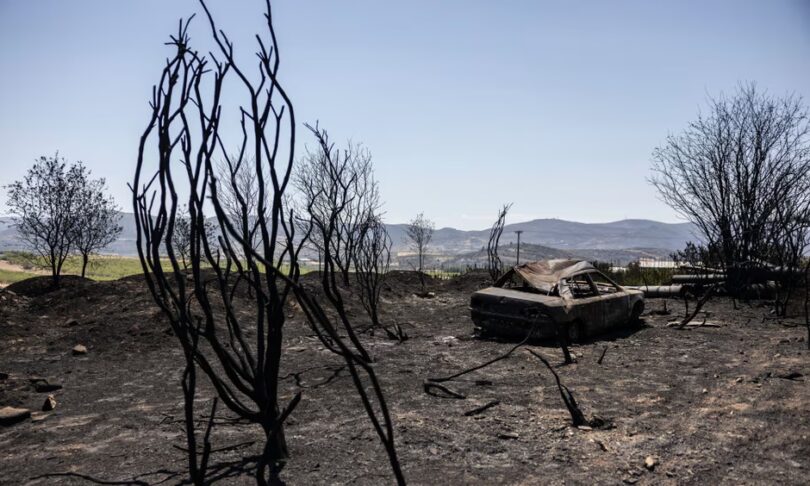Nesrine Malik
Asurreal video filmed by a tourist in “the most perfect location in Greece” last week, posted to show how “a weekend trip turned into survival mode in 24 hours”, could easily pass for a TV climate crisis awareness-raising campaign. It brings to mind two harrowing adverts released by Save the Children in 2014 and 2016, showing what life would look like for a British girl if war came to our shores and she became a refugee.
The brief Greece video unwittingly follows the same script of rapid unravelling: an idyllic waterside scene is instantly transformed, overshadowed by looming fire and smoke, then abandoned for boats, buses and waiting holding pens as hundreds of tired and bewildered people seek shelter and fail to secure flights out. The tourists get to go home, eventually. But the extreme heat and weather events that have characterised this summer in southern Europe, the internal displacement they caused and the disruption to tourism and the local economy they are wreaking, brings the continent ever closer to what is now a global experience. Over the past decade, almost 22 million people have been displaced every year by weather-related events. The projection is even more staggering. By 2050, the forecast is that 1.2 billion people will join the ranks of climate migrants, most of them from the countries with the lowest capacity to deal with the fallout from global heating.
They will not all be fleeing a fire or a flood. The climate crisis is not about a single photogenic weather event. The climate crisis is war, it is poverty, it is radicalisation, it is the disappearance of the habitat families have lived in for generations, and it is the geopolitical and security fallout of collapsing ways of making a living. The result is a movement crudely summed up as a “refugee crisis” – a description that makes a constant churn of displacement sound like an exotic temporary phenomenon that will abate, or can be quarantined to other countries, if only the barriers are raised high enough. But people displaced due to the climate crisis are rarely fleeing a temporary weather-related event – rather, the complicated, permanent repercussions of these events. In the Sahel, dwindling rainfall in Cameroon drove cattle herders into competition for water sources with fishing communities, triggering armed conflict that instantly sent thousands of people across the border to Chad, and ultimately created a stream of migrants making their way northwards to the Mediterranean and its perils.
In Micronesia, fresh water and fish supplies are dwindling as sea levels rise, storms become stronger and salt the farming earth, and beaches erode. The result is the devastation of entire communities and rising migration to the US. Across rural Iraq and Syria, members of struggling farming communities have swapped “backhoes for assault rifles” after droughts and unseasonal bouts of cold and heat made them easy targets for Islamic State recruitment. These calamities seem remote and unrelated to anything that could happen in the developed world. What we experience as freak weather events, erratic temperature fluctuations and a dystopian few days of New York under an orange smoke cloud are less alarming than they should be because they feel temporary and, ultimately, absorbable. They occur in relatively affluent urban economies with robust physical and financial infrastructures, ones that can cushion the mass movement of people, and their food and water provision in times of crisis. However briefly, though, these climate crisis-related events should act as a window on to a scenario where slow, small changes accumulate until a sudden, devastating impact permanently ejects you from your home and reshapes your ability to make a living. And yet this window is slammed shut by what has become, in the UK and Europe, a cruel political determination that other countries’ issues are not our problem. Most crucially, they don’t look like our problems.
What that ignores is that the refugee crisis increasingly is everywhere, even in the global north. “It just looks different,” says Jake Bittle, author of The Great Displacement: Climate Change and the Next American Migration. Having traced population moves in the US following extreme weather events and wildfires, he found that even those who have been displaced there due to storms, flooding and fires don’t see themselves as climate migrants. “They feel really secure in the global north because they feel like there is, if not a social safety net, then at least a financial safety net and access to liquidity and credit – they feel they will be disrupted temporarily. The reality is that your life can be derailed for years, even for people who are relatively well resourced.” As an example, Bittle cites the fact that multiple major home insurers have withdrawn from California. Wildfires have been so devastating that they were struggling to make money in the state. The result is that “the financial architecture of home ownership is falling apart. These sophisticated systems aren’t really built for an era where you’re seeing giant disasters every year. You’re not really any more protected than someone in the global south who has no formal home ownership structure at all”. This is especially true as these weather-related events start to become “chronic features of life”. It is an observation borne out in the reporting of the Institute for Economics and Peace. It concluded that Europe and North America would be better able than some to cope with ecological threats, but that the majority “will not be immune from wider impacts”.
When it comes to the threat of more displacement, it is a warning that most likely will not land with policymakers in the US and Europe, urge them act faster on the climate crisis or make them take kindly to those fleeing so many of its complex outcomes. Because being forced to move is something that happens to others, but not to us.
The Guardian







